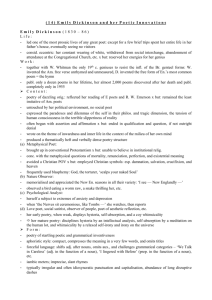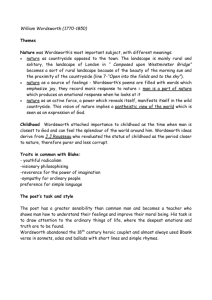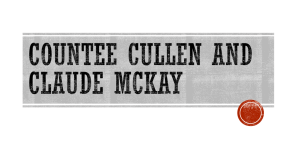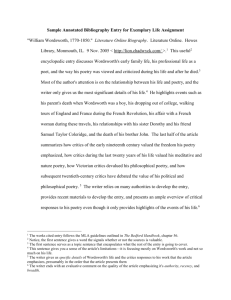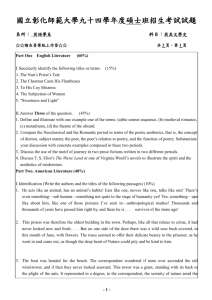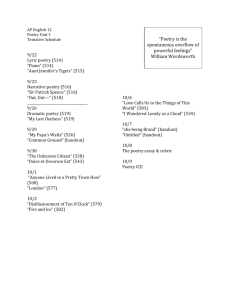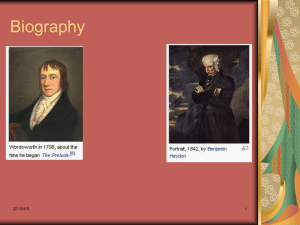Notes on the Preface to the Second Edition of Lyrical Ballads
advertisement
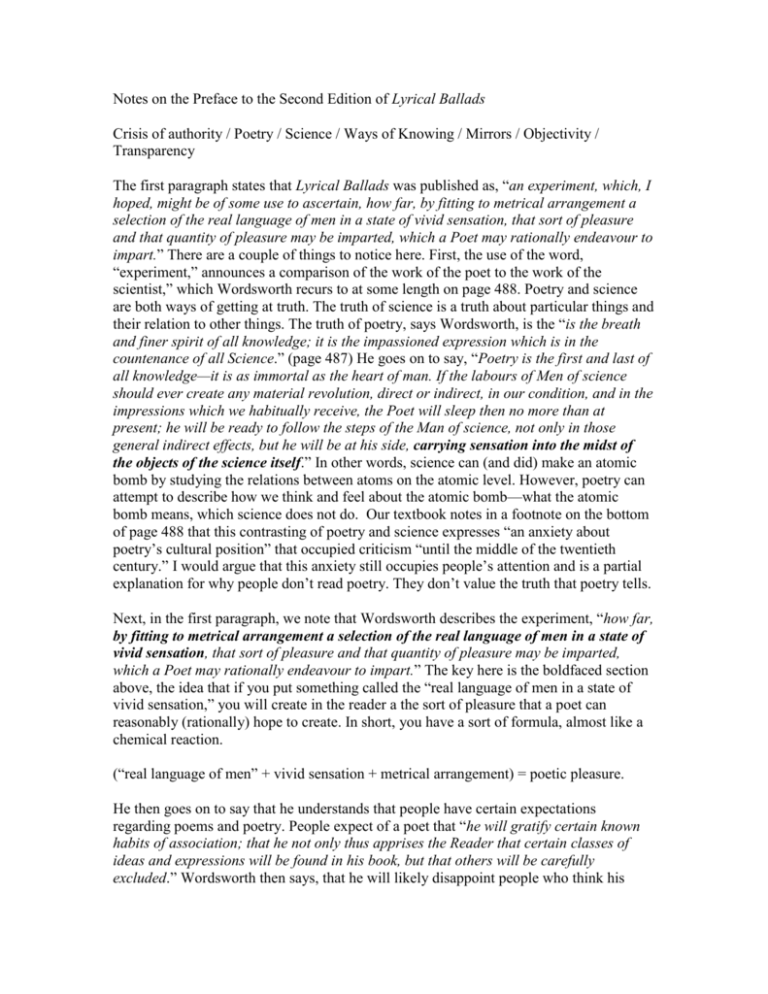
Notes on the Preface to the Second Edition of Lyrical Ballads Crisis of authority / Poetry / Science / Ways of Knowing / Mirrors / Objectivity / Transparency The first paragraph states that Lyrical Ballads was published as, “an experiment, which, I hoped, might be of some use to ascertain, how far, by fitting to metrical arrangement a selection of the real language of men in a state of vivid sensation, that sort of pleasure and that quantity of pleasure may be imparted, which a Poet may rationally endeavour to impart.” There are a couple of things to notice here. First, the use of the word, “experiment,” announces a comparison of the work of the poet to the work of the scientist,” which Wordsworth recurs to at some length on page 488. Poetry and science are both ways of getting at truth. The truth of science is a truth about particular things and their relation to other things. The truth of poetry, says Wordsworth, is the “is the breath and finer spirit of all knowledge; it is the impassioned expression which is in the countenance of all Science.” (page 487) He goes on to say, “Poetry is the first and last of all knowledge—it is as immortal as the heart of man. If the labours of Men of science should ever create any material revolution, direct or indirect, in our condition, and in the impressions which we habitually receive, the Poet will sleep then no more than at present; he will be ready to follow the steps of the Man of science, not only in those general indirect effects, but he will be at his side, carrying sensation into the midst of the objects of the science itself.” In other words, science can (and did) make an atomic bomb by studying the relations between atoms on the atomic level. However, poetry can attempt to describe how we think and feel about the atomic bomb—what the atomic bomb means, which science does not do. Our textbook notes in a footnote on the bottom of page 488 that this contrasting of poetry and science expresses “an anxiety about poetry’s cultural position” that occupied criticism “until the middle of the twentieth century.” I would argue that this anxiety still occupies people’s attention and is a partial explanation for why people don’t read poetry. They don’t value the truth that poetry tells. Next, in the first paragraph, we note that Wordsworth describes the experiment, “how far, by fitting to metrical arrangement a selection of the real language of men in a state of vivid sensation, that sort of pleasure and that quantity of pleasure may be imparted, which a Poet may rationally endeavour to impart.” The key here is the boldfaced section above, the idea that if you put something called the “real language of men in a state of vivid sensation,” you will create in the reader a the sort of pleasure that a poet can reasonably (rationally) hope to create. In short, you have a sort of formula, almost like a chemical reaction. (“real language of men” + vivid sensation + metrical arrangement) = poetic pleasure. He then goes on to say that he understands that people have certain expectations regarding poems and poetry. People expect of a poet that “he will gratify certain known habits of association; that he not only thus apprises the Reader that certain classes of ideas and expressions will be found in his book, but that others will be carefully excluded.” Wordsworth then says, that he will likely disappoint people who think his poems are going to look and feel like the popular poetry of the day, whose language he finds “gaudy” and “inane.” (p. 483). In other words, Wordsworth is announcing, and explaining, his “difference.” Wordsworth’s explanation (page 483) 1. I chose incidents and situations from common life 2. I used the “language really used by men” to describe and relate those situations. 3. At the same time, I “threw” a “certain coloring of the imagination” over them 3.1. thereby, “ordinary things should be presented to the mind in an unusual aspect” 3.2. And I made them interesting by tracing the “primary laws of our nature” 3.2.1. “chiefly, as regards the manner in which associate ideas in a state of excitement..” 4. Humble and rustic life was chosen 4.1. “essential matters of the human heart find a better soil there” to attain “maturity” 4.2. “are less under restraint” 4.3. “speak a plainer and more emphatic language” 4.3.1. because in country people “elementary feelings coexist in a state of greater simplicity.” 4.3.1.1.therefore they “may be more accurately contemplated” 4.3.1.2.And “more forcibly communicated.” 4.3.1.2.1. because rural life “germinates” manners from more “elementary feelings.” 4.3.1.2.2. because the “necessary character of rural occupations” are “more easily comprehended.” 4.3.1.2.3. and they are “more durable.” 4.3.1.2.4. finally, “in that condition [rural] the “passions of men are incorporated with the beautiful and permanent forms of nature.” 4.3.1.2.5. the language has been “purified” 4.3.1.2.5.1.because the “men hourly communicate with the best objects from which language is originally derived” 4.3.1.2.5.2.and because of the “sameness and narrow circle” of their social life, they are “less under the influence of social vanity” 4.3.1.2.5.2.1. they convey their “notions in simple and unelaborated expressions.” 4.3.1.2.5.2.2. which because it arises “out of repeated experience and regular feelings, is a more permanent, and a far more philosophical language, than that which is frequently substituted for it by Poets, who think that they are conferring honour upon themselves and their art, in proportion as they separate themselves from the sympathies of men, and indulge in arbitrary and capricious habits of expression, in order to furnish food for fickle tastes, and fickle appetites, of their own creation.” In other words, Wordsworth proposes a theory: that people in rural life speak a purified language because of their closeness to nature (best objects from which language was originally derived) and because they live in small communities they are not exposed to the “social vanity” that people in big cities must put up with, and because their language arises from the repeated experience of rural life (the rhythms, I guess, of farming) and not from the discontinuous experience of city life (where anything can happen and often does), their language is more permanent and more philosophical language than the fancy words used by poets who are trying to impress others and themselves with their vocabulary. In yet other words: Wordsworth is proposing that the language of rural life and the experience of rural life allow for a more transparent, more immediate, and more philosophic (deeper) way of expressing poetic truth and poetic pleasure. So: Transparency, nature (both as in wildness, but also as in rural human life) purity, and elementary or primary feelings and thoughts are valued. Wordsworth says at the bottom of 483 that his poems have a purpose. However, he says he does always begin to write with a distinct purpose, but that, “Not that I always began to write with a distinct purpose formerly conceived; but habits of meditation have, I trust, so prompted and regulated my feelings, that my descriptions of such objects as strongly excite those feelings, will be found to carry along with them a purpose.” In other words, whatever purpose a poem has is unconsciously discovered through “habits of meditation.” He goes on, “For all good poetry is the spontaneous overflow of powerful feelings: and though this be true, Poems to which any value can be attached were never produced on any variety of subjects but by a man who, being possessed of more than usual organic sensibility, had also thought long and deeply. For our continued influxes of feeling are modified and directed by our thoughts, which are indeed the representatives of all our past feelings; and, as by contemplating the relation of these general representatives to each other, we discover what is really important to men, so, by the repetition and continuance of this act, our feelings will be connected with important subjects, till at length, if we be originally possessed of much sensibility, such habits of mind will be produced, that, by obeying blindly and mechanically the impulses of those habits, we shall describe objects, and utter sentiments, of such a nature, and in such connexion with each other, that the understanding of the Reader must necessarily be in some degree enlightened, and his affections strengthened and purified.” Poetry = spontaneous overflow of powerful feelings. In other words, poetry is something that happens almost on its own, almost (note I am saying almost) a kind of possession or inspiration. Poetry is somehow if not irrational then a-rational—beyond reason. However, to achieve this spontaneous overflow you have to: 1) have more than usual organic sensibility (poetic sensitivity or talent) 2) have thought long and deeply 3) thoughts modify our feelings a) thoughts are themselves the representatives of past feelings. b) A representative of something is not the thing itself. For example, your representative in congress is not you but (in theory) represents your interests. Likewise, thoughts, to Wordsworth, are not past feelings, but represent past feelings. Perhaps like an accumulation of feeling on a particular topic? c) The poet relates these representative feelings to each other and, so, becomes aware of what is important to men d) The poet does this over and over so that making these connections becomes almost instinctive e) Then, when, the poetic moment happens (spontaneous overflow of powerful feelings) by obeying blindly and mechanically the impulses of those habits, we shall describe objects, and utter sentiments, of such a nature, and in such connexion with each other, f) that the understanding of the Reader must necessarily be in some degree enlightened, and his affections strengthened and purified.” In other words, the poet trains himself through meditation and “deep thinking” to make connections between various feelings and thoughts, almost weaving an internal network of feelings and thoughts. Then, when the poetic moment happens (the spontaneous overflow of powerful feelings), this network is activated so that whatever powerful feelings the poet has will connect with the appropriate feelings and thoughts from his past meditations. The reader’s understanding (his mind, spirit, soul) will be in some degree enlightened and his own feelings “strengthened and purified.” This process is somewhat reminiscent Matthew Arnold’s process in re: reading and society. We will see a slightly different version of this process later. Feeling and action and importance Page 484 Another circumstance must be mentioned which distinguishes these Poems from the popular Poetry of the day; it is this, that the feeling therein developed gives importance to the action and situation, and not the action and situation to the feeling. Here Wordsworth is saying that a seemingly small or humble event or thing or place or person can have deep resonance if endowed by the poet with feeling. In other words, a poet need not focus on heroic figures and heroic actions, but can endow or “ordinary life” or ruins (like Tintern Abbey) or nature and with a large importance. What matters is how the poet feels, the connections the poet makes. This section also reminds me a bit (albeit in reverse) of Marx’s idea that life forms consciousness, not consciousness, life. On the other hand, both Wordsworth and Marx believe in demystification, i.e. transparency. For Marx it is making the class struggle transparent to workers (so they will wake up and lose their chains). For Wordsworth, this transparency is directed inward toward one’s thoughts and outward toward “nature” or, later, God. The truth contained in poetry creates a way for the reader to become “enlightened” and “purified.” To see things as they really are. For Marx, it is communist thought or philosophy (or art) that enlightens the worker so that they can see their true relation to capitalists, i.e. understand the mechanisms of oppression and the means of liberation (struggle). Page 484 The subject [the relation between the feeling and action] is indeed important! For the human mind is capable of being excited without the application of gross and violent stimulants; and he must have a very faint perception of its beauty and dignity who does not know this, and who does not further know, that one being is elevated above another, in proportion as he possesses this capability. It has therefore appeared to me, that to endeavour to produce or enlarge this capability is one of the best services in which, at any period, a Writer can be engaged; but this service, excellent at all times, is especially so at the present day. In other words exposure to poetry enlarges people’s sensitivity and their ability to make connections. He then decries the multitude of causes, unknown to former times, are now acting with a combined force to blunt the discriminating powers of the mind, and, unfitting it for all voluntary exertion, to reduce it to a state of almost savage torpor. He blames the increasing accumulation of men in cities, where the uniformity of their occupations produces a craving for extraordinary incident, which the rapid communication of intelligence hourly gratifies. to this tendency of life and manners the literature and theatrical exhibitions of the country have conformed themselves. And a degrading thirst after outrageous stimulation Doesn’t this remind you of many of the arguments against our own popular culture? Page 484 /485 More About Language and Transparency On page 485 Wordsworth talks more about language, “Without being culpably particular, I do not know how to give my Reader a more exact notion of the style in which it was my wish and intention to write, than by informing him that I have at all times endeavoured to look steadily at my subject; consequently, there is I hope in these Poems little falsehood of description, and my ideas are expressed in language fitted to their respective importance.” Note the idea here of “looking steadily,” i.e. of seeing clearly. If you see whatever it is you are describing clearly, your descriptions of that thing in poetry will be more truthful. That is, if the thing you are looking at is more transparent to you, your descriptions will become more truthful. The trick is learning how to see. Not simply to look at something or someone, but to see them clearly, freshly, without stereotypes. Next Wordsworth discusses the way he uses language in poetry, attempting to prove that ordinary language is suited to the best poetry. He uses a poem by Thomas Gray to prove his point, showing how the most powerful part of Gray’s poem is that part written in the simplest language. He then discusses the difference between the language of good poetry and good prose and says that there is none. This threatens to collapse the difference between poetry and prose. However, Wordsworth notes that the language of poetry is set to meter and made with “true taste and feeling.” Another important point Wordsworth is implicitly making: that poetry ought to be accessible to people. If it is written in their language, they will read it. If it is not, they will not. I answer that the language of such Poetry as is here recommended is, as far as is possible, a selection of the language really spoken by men; that this selection, wherever it is made with true taste and feeling, will of itself form a distinction far greater than would at first be imagined, and will entirely separate the composition from the vulgarity and meanness of ordinary life; and, if metre be superadded thereto, I believe that a dissimilitude will be produced altogether sufficient for the gratification of a rational mind. On page 486, Wordsworth then goes on to define a poet: What is a Poet? to whom does he address himself? and what language is to be expected from him?—He is a man speaking to men: a man, it is true, endowed with more lively sensibility, more enthusiasm and tenderness, who has a greater knowledge of human nature, and a more comprehensive soul, than are supposed to be common among mankind; a man pleased with his own passions and volitions, and who rejoices more than other men in the spirit of life that is in him; delighting to contemplate similar volitions and passions as manifested in the goings-on of the Universe, and habitually impelled to create them where he does not find them. to these qualities he has added a disposition to be affected more than other men by absent things as if they were present; an ability of conjuring up in himself passions, which are indeed far from being the same as those produced by real events, yet (especially in those parts of the general sympathy which are pleasing and delightful) do more nearly resemble the passions produced by real events, than anything which, from the motions of their own minds merely, other men are accustomed to feel in themselves:— whence, and from practice, he has acquired a greater readiness and power in expressing what he thinks and feels, and especially those thoughts and feelings which, by his own choice, or from the structure of his own mind, arise in him without immediate external excitement. Later, on page 488 he adds: Among the qualities there enumerated as principally conducing to form a Poet, is implied nothing differing in kind from other men, but only in degree. The sum of what was said is, that the Poet is chiefly distinguished from other men by a greater promptness to think and feel without immediate external excitement, and a greater power in expressing such thoughts and feelings as are produced in him in that manner. But these passions and thoughts and feelings are the general passions and thoughts and feelings of men. and with what are they connected? Undoubtedly with our moral sentiments and animal sensations, and with the causes which excite these; with the operations of the elements, and the appearances of the visible universe; with storm and sunshine, with the revolutions of the seasons, with cold and heat, with loss of friends and kindred, with injuries and resentments, gratitude and hope, with fear and sorrow. These, and the like, are the sensations and objects which the Poet describes, as they are the sensations of other men, and the objects which interest them. The Poet thinks and feels in the spirit of human passions. How, then, can his language differ in any material degree from that of all other men who feel vividly and see clearly? It might be proved that it is impossible. But supposing that this were not the case, the Poet might then be allowed to use a peculiar language when expressing his feelings for his own gratification, or that of men like himself. But Poets do not write for Poets alone, but for men. Unless therefore we are advocates for that admiration which subsists upon ignorance, and that pleasure which arises from hearing what we do not understand, the Poet must descend from this supposed height; and, in order to excite rational sympathy, he must express himself as other men express themselves. to this it may be added, that while he is only selecting from the real language of men, or, which amounts to the same thing, composing accurately in the spirit of such selection, he is treading upon safe ground, and we know what we are to expect from him. Much as he does with language (and at the same time), Wordsworth makes an argument that poets do not differ from other men in essentials, but only in the degree of their ability to think and feel. In other words, they are the same as other guys, but not quite. That being the case, the poet will use the language of ordinary people, but he will use it selectively and imaginatively. But, again, the language used will be an accessible one. Poetry is not something reserved for the educated classes. All (literate) men and women can enjoy it. Pleasure Wordsworth has a theory of the relation of pleasure (and pain) to poetry. He states (below) that the only necessity that poetry operates under is that of giving pleasure. He then states that, except for giving pleasure, there is no “object” standing between the Poet and the image of things—whereas for a biographer or historian or scientist, etc. there are many object. For example, a historian must not only give pleasure but be historically accurate—whereas this is not a necessity for the poet. He then goes on to point out that even science is based in pleasure—the pleasure in knowing things. He then compares the activity of the poet (contemplating nature and coming back with pleasurable knowledge) and that of the scientist (contemplating nature and coming back with pleasurable knowledge.) What the two do when they contemplate may be different, but they both produce valuable and pleasurable knowledge. Page 487: The Poet writes under one restriction only, namely, the necessity of giving immediate pleasure to a human Being possessed of that information which may be expected from him, not as a lawyer, a physician, a mariner, an astronomer, or a natural philosopher, but as a Man. Except this one restriction, there is no object standing between the Poet and the image of things; between this, and the Biographer and Historian, there are a thousand. 18 Nor let this necessity of producing immediate pleasure be considered as a degradation of the Poet’s art. It is far otherwise. It is an acknowledgement of the beauty of the universe, an acknowledgement the more sincere, because not formal, but indirect; it is a task light and easy to him who looks at the world in the spirit of love: further, it is a homage paid to the native and naked dignity of man, to the grand elementary principle of pleasure, by which he knows, and feels, and lives, and moves. We have no sympathy but what is propagated by pleasure: I would not be misunderstood; but wherever we sympathize with pain, it will be found that the sympathy is produced and carried on by subtle combinations with pleasure. We have no knowledge, that is, no general principles drawn from the contemplation of particular facts, but what has been built up by pleasure, and exists in us by pleasure alone. Notice the “scientific” way Wordsworth describes the activity of the poet—in “Arial” typeface below. Page 487: What then does the Poet? He considers man and the objects that surround him as acting and re-acting upon each other, so as to produce an infinite complexity of pain and pleasure; he considers man in his own nature and in his ordinary life as contemplating this with a certain quantity of immediate knowledge, with certain convictions, intuitions, and deductions, which from habit acquire the quality of intuitions; he considers him as looking upon this complex scene of ideas and sensations, and finding everywhere objects that immediately excite in him sympathies which, from the necessities of his nature, are accompanied by an overbalance of enjoyment. Page 487: He considers man and nature as essentially adapted to each other, and the mind of man as naturally the mirror of the fairest and most interesting properties of nature. and thus the Poet, prompted by this feeling of pleasure, which accompanies him through the whole course of his studies, converses with general nature, with affections akin to those, which, through labour and length of time, the Man of science has raised up in himself, by conversing with those particular parts of nature which are the objects of his studies. The notion of comparing poetry (and of literature and art more generally) to a mirror is the subject of a famous book, M.H. Abrams, “The Mirror and the Lamp.” In that book Abrams discusses what it means to consider literature as a mirror. Mirrors do two things: they reflect whatever is placed in front of them and, by reflecting, create a double. The reflection is not the original—but an image of it. Moreover, the reflection is not a perfect double, but a reversal and, therefore, a kind of distortion. Moreover, mirrors can distort by the way the glass is curved, etc. If “objectivity” is your goal, then you must account for this distortion to create an “objective” Also, a mirror is always a partial reflection, i.e. it can only reflect as much as its surface allows. A lamp, on the other hand, does not pretend to be a copy of anything (think of a light bulb), but only to illuminate the world around it to a greater or lesser degree. To say that the “mind of man” “is naturally the mirror of the fairest and most interesting properties of nature” is to say a couple of things: 1) that the mind of man is a curious mirror in that it does not reflect the whole of nature but only its fairest and most interesting parts (Baudelaire would agree, perhaps, that the mind of man reflects nature—but all of it and more). It also creates a correspondence or equivalence between man and nature (because they reflect one another) that allows a poet to speak authoritatively about nature in somewhat the way science does. That is because one way to think about science is to think of it as a mirror of reality. E=MC2 is a description (a mirror), an image of reality or a certain portion of reality (remember mirrors can only reflect what their surface allows). If you think about science as mirror (and there are other ways to think about science), then you might say that science is always trying to create more accurate mirrors (less distortion) and larger mirrors (more general laws). In other words, by saying that poetry and science are both mirrors, then you are saying that they can both speak authoritatively on their chosen subjects. P. 489 Containing the energy unleashed by poetry If poetry can unleash truth of nature (like science), it can possibly unleash this truth in an irresponsible way. Wordsworth says that rhythm and rhyme can contain the energy. This is, perhaps, an attempt to deal with the issue of emotion in poetry and emotion being traditionally thought of as
